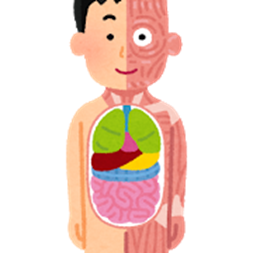Interoception, including visceral sensations, is a sensory system for perceiving one’s own physiological conditions within the body. It is considered essential for maintaining homeostasis and fundamentally important for human health.
For more information on interoception, please refer to “Interoception and Psychosomatic Medicine.”

Significance in Psychosomatic Medicine and Psychosomatics
The main significance of the interoception in psychosomatic medicine includes the following:
- The centripetal interoceptive sensation is involved alongside centrifugal autonomic and endocrine functions as roots of psychosomatic correlation, highlighting the importance of the interoceptive sensation system in the mechanism of psychosomatic correlation.
- It serves as the physiological basis for “awareness of mind and body”, characteristic of psychosomatic disorders such as alexithymia and alexisomia. This awareness is related to self-coping in daily life and is crucial for symptom self-control.
- It is involved in the sensitivity of symptoms such as pain thresholds and physical symptom amplification.
The neuroscience mechanisms of interoception have gradually become clearer, with reports on its relationship with psychological and emotional functions, physiological functions such as the autonomic nervous system, and mental functions and decision-making. Research on its relationship with various psychosomatic interventions such as mindfulness and meditation is also progressing.
We are advancing studies on several psychosomatic issues from the perspective of interoception.
Related Projects
Society for Alexisomia Research
http://body-thinking.com/alexisomia/
References
Kanbara, K., Fukunaga, M. Links among emotional awareness, somatic awareness and autonomic homeostatic processing. BioPsychoSocial Med 10, 16 (2016). https://doi.org/10.1186/s13030-016-0059-3
